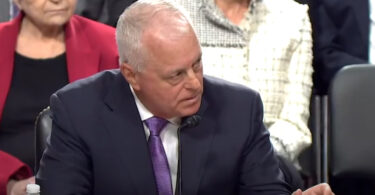By Lt Col. Ken Segelhorst, US Army ret | SOFREP
On February 12, more than 50 students at Patch Middle School in Stuttgart, Germany, staged a walkout in response to recent Pentagon moves to reevaluate Diversity, Equity, and Inclusion (DEI) initiatives within the Department of Defense (DoD), including Department of Defense Education Activity (DoDEA) schools.
The students left their classrooms, carrying signs and chanting in support of DEI initiatives, with some openly criticizing the policy changes.
According to reports, faculty and staff were present during the demonstration, raising concerns about possible encouragement or facilitation.
While there is no direct proof that faculty organized the protest, their presence raises questions about whether students acted independently or received guidance from school officials.
Student activism at the college or even high school level is not unusual. But when it starts appearing in middle schools, it raises questions: Did these students organize the event independently, or was there faculty and staff involvement?
It is difficult to believe that such a well-coordinated protest – timed to coincide with newly appointed Secretary of Defense Pete Hegseth’s visit – emerged without adult involvement.
This incident is just the latest indication that DoDEA has become a front line for advancing politicized education, particularly through DEI initiatives.
I’m told this was a mixture of military spouses and Department of Defense Education Activity educators. 😳 https://t.co/p4IO9E53HR
— Kristina Wong 🇺🇸 (@kristina_wong) February 11, 2025
The Ideological Shift Within DoDEA
DoDEA schools, which exist to educate the children of military service members and DoD civilians, have increasingly adopted DEI-focused policies that go beyond simply promoting inclusion.
Over the past few years, DoDEA has been criticized for integrating social justice frameworks into its curriculum, often through the use of materials from organizations such as the Southern Poverty Law Center (SPLC).
These materials, including the SPLC’s “Social Justice Standards,” structure education around Identity, Diversity, Justice, and Action – introducing politically charged frameworks into federally funded classrooms.
A report from OpenTheBooks, an American non-profit focused on government oversight, highlights how DoDEA has been promoting what it calls “transformative Social and Emotional Learning (SEL).”
In practice, this involves teaching children to view issues through the lens of privilege, identity, and systemic oppression, often requiring students to engage in emotionally charged conversations about race and power dynamics.
While proponents argue that such lessons foster inclusivity, critics contend that they serve to inject partisan ideology into an educational system that should remain politically neutral.
Rebranding DEI to Avoid Scrutiny
DoDEA’s commitment to these programs remained steadfast even when the first Trump administration issued executive orders prohibiting federal agencies from funding DEI-related training.
Rather than dismantling these initiatives, DoDEA engaged in rebranding efforts, swapping terms like “social-emotional learning” for “resilience” while continuing to push the same ideological content under new labels.
This approach suggests a deliberate effort to circumvent policy changes at the federal level and maintain an ideological agenda within the school system.
Moreover, the use of taxpayer dollars to fund DEI-based instruction contradicts the Department of Defense’s stated mission of providing a high-quality education free from political influence.
While DEI proponents frame their efforts as necessary for fostering a welcoming environment, the reality is that these programs often encourage political activism among students – activism that, as seen at Patch Middle School, raises concerns about whether faculty and staff are actively facilitating such demonstrations.
Encouraging Activism Over Education?
The Patch Middle School walkout should be viewed in this broader context. It raises an important question: Would DoDEA have allowed a similar protest against DEI policies?
Middle school students do not typically organize political demonstrations without guidance from adults. If faculty or staff played a role in encouraging or facilitating this event, it would not be the first time that DoDEA schools have crossed the line from education into advocacy.
Would DoDEA have allowed a student protest against DEI policies? The answer is likely no -exposing a clear double standard in how student activism is permitted or discouraged.
If students walked out in protest against mandatory DEI training or the incorporation of CRT-inspired curricula, would DoDEA still ‘respect their rights to peacefully express their opinions,’ or would participants and organizers have faced swift disciplinary action?
A Systemic Focus on DEI
Beyond individual incidents, DoDEA’s institutional commitment to DEI is evident across its policies, curriculum, and staff training.
The organization has embedded DEI principles into professional development, requiring educators to undergo training on equity and cultural competency.
This has raised concerns among critics who argue that such training often leans heavily on politically charged concepts rather than focusing on traditional academic excellence.
Furthermore, DoDEA has integrated DEI language into student programs, ensuring that discussions of race, identity, and social justice are prioritized across various subjects.
The incorporation of Southern Poverty Law Center resources and similar materials suggests a concerted effort to align the educational framework with a particular ideological viewpoint, rather than fostering age-appropriate critical thinking and understanding among students.
Why It Matters
The children of service members deserve an education that prepares them for academic and professional success – not one that prioritizes ideological activism over education.
DoDEA is federally funded and should be held to a standard of political neutrality. Instead, it appears to have been transformed into a vehicle for politicized education, often at the expense of students’ actual learning.
Parents and service members who entrust DoDEA with their children’s education should demand greater transparency and accountability.
If DoDEA truly believes in fostering critical thinking and respect for diverse viewpoints, it must remove ideological bias from education and restore ideological balance in its curriculum and school policies.
Until the Department of Defense takes steps to identify and remove ideological activists within DoDEA, incidents like the Patch Middle School walkout will continue to fuel concerns that the agency prioritizes indoctrination and activism over education.
Ken Segelhorst is a retired U.S. Army lieutenant colonel with over 20 years of service. As a Green Beret and information operations practitioner, he operated extensively across the Middle East and Africa, leading combat operations and advising U.S. ambassadors and foreign officials. In addition to his operational experience, Ken served as an assistant professor at the United States Military Academy at West Point, where he was the course director for MX400: Officership, the superintendent’s capstone course. His time at West Point provided an unfiltered view of the cultural shortcomings and systemic challenges plaguing both the academy and the broader military, fueling his advocacy for greater accountability, reform, and transparency.
Pentagon Secretly Institutionalized DEI In Its K-12 Public Schools








Leave a Comment